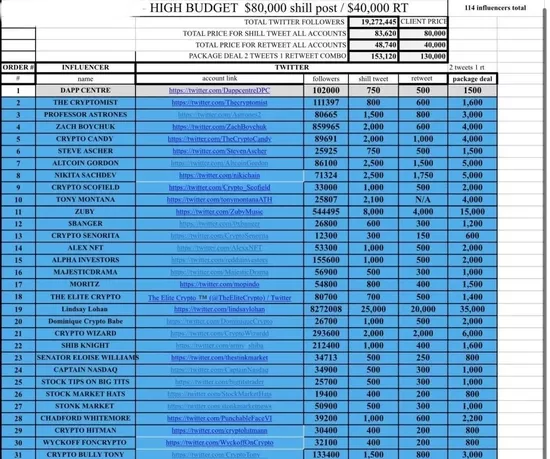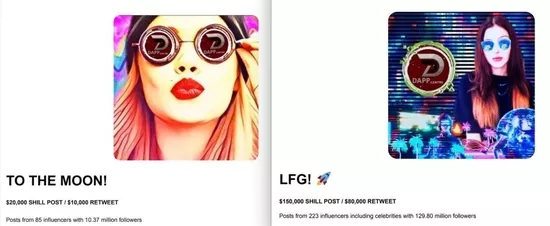NFT made a big fire last year, crossing the fields of art, games, avatars and finance. According to the report released by nonfungible, a data company, the transaction volume of NFT in 2021 was close to US $17.7 billion, an increase of about 210 times from US $82 million in 2020. The high popularity of NFT has attracted global attention, but the excitement only belongs to a few people after all. Except for a few project parties and early investors who bet on blue chip projects, most of them just bought a "JPG" and changed their avatar.

But there are also a group of people who have made a lot of money because of NFT, but they are not as big as well-known project parties or encryption artists, which is a typical muffled sound and great wealth. They are the NFT encryption network red group.
Recently, a price list has been circulated on the Internet. Some encrypted networks send a tweet to promote an NFT project, charging more than $20000.
Net red belt goods NFT has become an economic industry. So, how do these online celebrities get rich through "bring goods NFT"?
Original is more expensive than forwarding
More favorable package
Ashley Duncan's name is on this price list. She used to be a business analyst at a software company, worked as a real estate agent and worked in a bank, but she has never liked her new job as much as she does now - posting on Twitter and paying to promote NFT.
The income of this job is higher than ever before. She makes more money in two months than in the previous year. "I can make a living by tweeting and communicating with people. Who else can do that?" "It's crazy," she said
Earlier last year, Ashley became active in the cryptocurrency community on Twitter and initially accumulated followers by sending expression packs and jokes. She soon found that she could make money by promoting NFT to a growing audience. By October last year, she had earned enough money to quit her original job and do paid promotion and consultation of NFT encryption project full-time.
According to the price list circulated, the price of an original tweet published by KOL such as Ashley ranges from several hundred to tens of thousands of dollars: a blogger with a small coffee position charges more than 100 dollars, and a tweet by female star Lindsay Lohan costs 25000 dollars. For a one-time payment of $80000, you can buy the original tweets of all accounts on the list. The quotation forwarded is lower, about half the original price.

The encrypted net red tape price list circulated on the Internet| Source: Twitter account @ zachxbt
It will be more cost-effective to buy a "package". A "package" includes two original and one forwarding. The price is basically the amount of two original, and forwarding is equivalent to a gift.
The gold owners are the project parties of NFT or cryptocurrency, and they are willing to pay for this promotion model.
Dank bank, a start-up company that worked with Ashley, recently raised $4 million to build an NFT project focusing on expression packs and wonderful videos. Harry Jones, founder and CEO, is willing to spend money on NFT with goods online popularity, because traditional advertising does not work in the field of encryption, and people in the encryption community will not be motivated to buy by traditional advertising.
On the contrary, potential consumers of these encryption projects are more willing to seek advice from KOL, the online celebrity they trust.
Online celebrities are "influential people" in the encryption world, and most of their influence comes from the extension of the real world. They promote encryption projects to hundreds of thousands or millions of people on social media. The consumption concept in the web 3 world has not got rid of the purchase habit of Web 2 - in the decentralized ecology, people are more willing to buy products under the centralized recommendation mechanism.
That's why Ashley people are so enthusiastic. All encryption projects need their endorsement, and the income will continue.
In addition to Ashley, there are hundreds of people on the quotation, including instagram models, professional hockey players, E-sports players, rappers... Influential people around the world are promoting NFT or other encryption projects on twitter, youtube and tiktok.
Canadian record artist Kyle fortch has turned to selling NFT projects to get paid. Udeme William, a former NGO worker from Nigeria, is now coordinating the transaction of encryption projects all day, providing marketing scripts, pictures and information to the company.
In the imagination of the outside world, online Red bloggers rely on tweeting content to make money, which is a creative work. In fact, part of the work of NFT carrying goods is mechanical, even automated.
Leave a message to these bloggers and usually get a reply like robot customer service in a few seconds: enter "promotion" or "price" to view my price list.
MCN at NFT boundary
Before becoming a crypto Internet celebrity, William could only earn two or three hundred dollars a month. Due to the increasing inflation, his salary sometimes couldn't even meet the basic living needs such as food, transportation and housing. He had to rely on high interest loans to make a living. With a miserable life, he fell in love with entering the encryption circle, opened a twitter account to share his experience, and gained a wave of followers. Even Zhao CHANGPENG, the founder and CEO of Qian'an, also paid attention to his account.
William gave full play to his influence and began to promote NFT projects. He worked for an NFT company in Africa and signed a contract with nabox, another company, to help them contact other encrypted netizens, let them tweet about a project every day, and promote it on other social media, bringing exposure and potential investors to the project. Part of the company's promotion expenses go to those online celebrities, and the rest belongs to William.
Nabox's business is similar to the intermediary or MCN of the encrypted world. Instead of looking for online celebrities who are willing to take over one by one, NFT project parties might as well go directly to the brokerage company with talent resources to coordinate the transaction.
DAPP centre is a marketing company specializing in this business. The team claims to have a cooperation list containing more than 200 encrypted netizens, which can hold large-scale activities. After the price list leak, the official account of DAPP centre sent a Twitter: "all you have to do is send me a private message and get my quotation."
The price they offer is not cheap. One is called "LFG!" (Let』s fucking go!) Packages range in value from $3000 to $150000. These promotional messages will be sent to instagram, youtube and tiktok. There is also a more expensive package, which costs $300000 and includes more than 200 twitter accounts, with two original messages and one forwarding message from each account. Each netizen has an account score, and his personal income is as high as 35000 US dollars.

DAPP Centre offers some marketing package options to potential customers| Source: Vice
Some netizens on the list said that the company's offer was falsely high. Some people didn't know who DAPP centre was. Some even said they didn't do encryption payment promotion at all.
At present, the official twitter account of DAPP centre has been suspended, and the specific reason is unknown. The "online Red" column has been closed on the company's official website, and the above package quotation has been displayed here.
Netizens have different attitudes towards marketing companies. Some prefer to cooperate directly with encryption project parties, while others are willing to bind with middleman marketing agencies.
Crypto bri is one of the US crypto celebrities on the list, but she forgot that she had worked with DAPP centre. Her charging price is much lower than the price listed by the company, but she can understand the mind and operation of marketing agencies to make a difference. "Marketing companies usually pay me the price of a tweet and then charge two to three times the price to the project's customers."
If NFT project parties want to do a two-week marketing activity, they will probably choose to find an intermediary company, which can avoid the trouble of finding and contacting online celebrities, and the signing process is more worry-free.
At present, well-known NFT projects in the global market, such as bored ape Yacht Club (bayc) and cryptopunks, also have their own marketing company NFT community. After understanding the project ideas, the company will formulate appropriate marketing strategies and budgets and launch promotion on major social platforms. KOLs will release them at least three times a day and can also board giant billboards on the streets of prosperous cities.
The cooperation between wanghong and marketing companies is a means of small profits and quick turnover. DAPP centre will also review the reliability of the project party for netizens and provide content templates for original tweets. After Kyle fortch, a Canadian record artist, became a crypto Internet celebrity, he admired DAPP centre and considered them "one of the more important partners than the project party".
03
"Net red" is also afraid of regulation
Fortrh is a cautious crypto netizen and attaches great importance to his reputation in the circle. When he receives the project, he only charges in the form of fixed price and does not accept the token of the project.
The token of the project is a common reward when the coin circle is looking for someone to promote or the platform. If the price of the token is fried high, the endorser can gain extra high profits, just like Li Xiaolai, the "richest man on the platform" who was popular in the coin circle in those years.
Fortch's reason for doing so is to worry that the project party will pack up and run away after the project is on fire. If a fan comes to plead guilty, he can frankly say that he has not boosted the Hype: "I'm not even a token holder." Before signing a contract with the marketing company, fortch will also back tune the other party to ensure that the company will not use his money to disappear after speculation.
Fortch also insists on originality in the content of the copy. He really hates people "stuffing things" into his mouth. So many encryption project parties hope that fortrh can write tweets or videos in its own style. Such content will not look like commercial advertisements.
Fortch now focuses on taking over one or two projects a month to diversify its products, not only publishing a tweet, but also promoting it through podcasts and helping the project carry out behind the scenes marketing. He hopes to integrate his interests and make a "encrypted music video" one day. "I'm trying to expand my value, not just a tweet."
"This is a fantastic scene of making wealth." Ashley, who works full-time as a red belt for encrypted networks, said, "not everyone has such opportunities, so we can't take it lightly."

Ashley will take the initiative to disclose his paid promotion projects| Source: Twitter
Ashley found an online community composed of online celebrities. Everyone exchanged views in it, hoping to build the community into a more professional and trustworthy space. She doesn't like the term "Internet celebrity", although she occasionally says so herself. She found it easy to associate the word with "liar". She is now more cautious in choosing partners and tries to find long-term partners and build mutual trust.
William doesn't like to wind up a project to get paid. He's looking for a job that can last from six months to a year.
Jones supports such an ecological change in the industry. He believes that online Red KOL is crucial to the development of the encryption industry and market. It is "strange" and "disrespectful" to price them only by a tweet.
Crypto netizens have received a lot of remuneration by paying for promotion. They carefully operate their own personal devices and are also testing on the edge of the law. They have entered the regulatory vision of the Federal Trade Commission (FTC).
The focus of controversy is how to determine that Twitter involving project promotion content belongs to paid promotion and what standards apply.
Sort out the twitter accounts on the leaked list. Some of them indicated in their personal data that they were promoting encryption projects and listed the contact information of business cooperation; Some people say they are employed by an encryption project; Some people claim to be "encryption promoters" or "encryption red", but emphasize that their tweets are "not financial suggestions".
According to FTC regulations, online paid promotion must make clear disclosure in promotion tweets, not just on the blogger's personal data page. If it is a paid promotion on YouTube or tiktok, the blogger must disclose it in the whole promotion video, and can't add labels only in a certain period of time such as the beginning or end of the film. The information disclosure must be displayed "clearly and prominently" next to the paid promotion content.
Under the general rule, if there is an unexpected connection between the spokesperson and the marketing organization, which will affect consumers' evaluation of advertising, then this connection should be made public. A spokesman for FTC technical affairs said that the general rules applied to encryption projects were no exception.
When selling encryption products, if nethong does not publicly declare that it has a financial relationship with the project company or marketing agency, it may violate the Federal Trade Commission Act and theoretically face fines or even bans, which may prohibit them from continuing to promote products in the future.
David Klein, a lawyer who studies Internet marketing and advertising law, points out that this is especially true if encryption companies are headquartered in the United States. FTC regulations apply to companies of any size and industry, and even to social media platforms. Wanghongda people, marketing companies and encryption project parties are the regulatory objectives of FTC. "Everyone in the chain has a responsibility."
All parties shall sign a written agreement to jointly comply with FTC regulations and disclosure guidelines. After signing the agreement, the company is obliged to continuously monitor the project promotion activities. "It's no use burying your head in the sand and pretending to be invisible. The criterion is whether you know or should know." Klein said.
Fortch opposes such regulation. He believes that the responsibility of encryption KOL is to tell the followers that the document promotion is based on personal opinions rather than financial suggestions, and the followers should do their own research. "It's more important than telling them I make money by sending soft text." Fortch sometimes adds the theme tag "advertising" to his tweets, but he doesn't think it's necessary.
"I hate people thinking I can influence the market. No one should have this power." Ashley said, "but some people say I have."
According to cointegraph, markets and markets, an American market research company, predicts that one of the key factors affecting the global NFT market in the next five years will still be mainstream online popularity. It is estimated that the probability is still these "listed" KOLs.
reference material:
https://www.vice.com/en/article/pkp9wg/leaked-shill-price-list-shows-wild-world-of-crypto-promos
https://cointelegraph.com/news/nft-market-well-positioned-to-grow-35-into-a-13-6b-industry-by-2027
https://nft-community.org/about/
*Header source: thenewstack
Author Xue Xiaowan editor Jing Yu
Source: geek Park